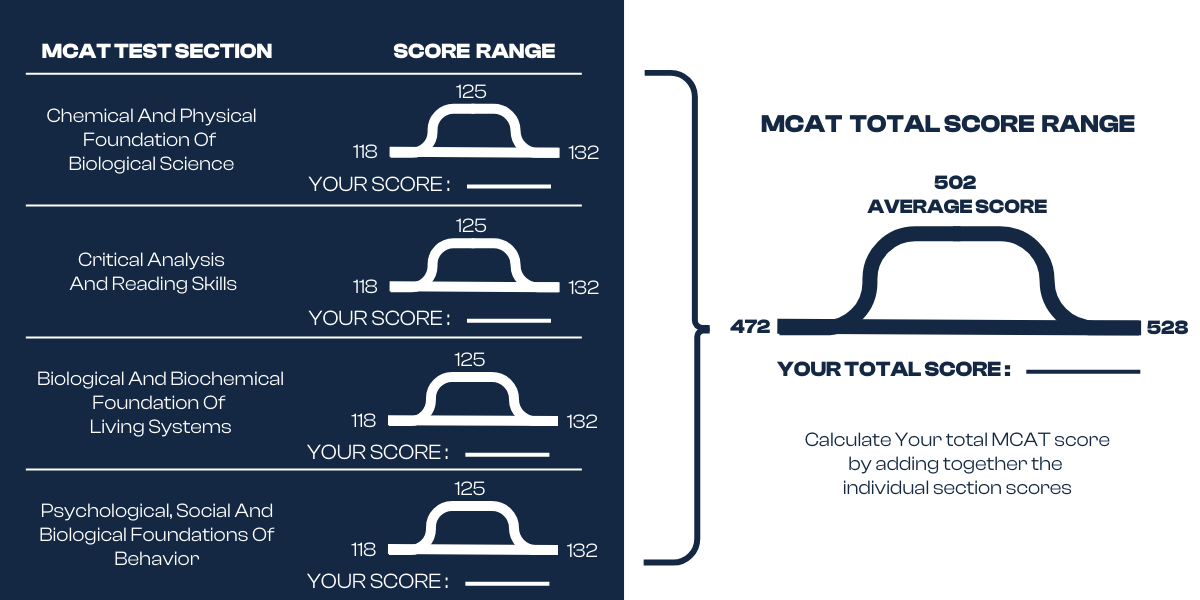Is Your MCAT Score Range Ready for Med School Dreams?
The MCAT score range holds significant importance for medical students. It’s a gateway to their dreams of becoming a healthcare professional and compassionate healer.
The MCAT score range predicts the probability of admission to the world's best medical institutions. Only a good score aggregate assures you success. It’s crucial to build your understanding of a good, average, and highest score to succeed. But it is still unclear how to calculate your total score. Let's find out how.
What is MCAT scoring system?
The Medical college admission test (MCAT) is a multiple choice exam that is administered by the Association of American Medical Colleges (AAMC). This test plays a crucial role in medical school admission in the United States of America (USA) and several other countries. It’s based on the number of questions you answered correctly. You need to answer all the questions on the MCAT test sheet, even if you attempt a guess answer. Here’s how AAMC calculates your MCAT score:
Firstly, your raw score or answer score is checked, and then it is converted into a scaled score.
The scaled score range is 472 to 528 points, the collective of 4 sections.
After the section score, your percentile rank is generated based on the performance of other test takers.
At the end, you receive a 5 score on your MCAT exam, 4 section score marks and one total mark.
It’s important to understand the overall scenario of the MCAT scoring system. So that you better understand how you’ll prepare yourself for exams. However, it’s just one factor, medical schools consider other factors too. This includes GPA, letters of recommendations, extracurricular activities and other personal statements.
What Is A Good MCAT Score?
A good MCAT score falls under 128 to 132 points in all sections and 511 out of 528 overall. You need to maintain your score throughout your exam so that you can achieve success and go to your dream medical college. The good, average, and high are related terms and are relatively dependent. There is no concept of pass or fail; scores are acceptable for medical college admission if you achieve that specific score.
What is the MCAT score range for medical students? Here's a list that helps you maintain your average score.
The average MCAT sectional score is 125, and the combined score is 501.
The good MCAT sectional score is 128, and the combined score is 511.
The higher MCAT sectional score is 129, and the combined score is 518.
Why It's Important To Achieve A Good MCAT Score?
Achieving a balanced score on the MCAT is essential because it increases your competitiveness, demonstrates adaptability, and prepares you for the variety of obstacles you'll face in medical school and your future career. An all-around score increases your confidence as a good candidate in the medical sector and opens doors to many disciplines.
How is the MCAT Scored?
The MCAT score range is measured on a scale of 472 to 528 points, where 472 is the lowest and 528 is the highest. But these score is a combination of different other score, which are illustrated below:
Section Score
All questions in a section are worth the same and there is no guessing penalty.
It’s best to aim for a balanced score between the sections than high variation.
Scores range from 118 to 132. 125 is the median for test-takers, while 128 is the median for admitted M.D. students.
Total Score
There are 4 sections in the MCAT score
Chemical And Physical Foundation Of Biological Science: (59 Q)
Critical Analysis And Reading Skills (53 Q)
Biological And Biochemical Foundation Of Living Systems (59Q)
Psychological, Social And Biological Foundations Of Behaviour (53Q)
The total score is the combination of these 4 sections, between 472 to 528 points, and 502 is the average score for test-takers. These numerical scores correspond to a percentile rank that shows how your score compares to others. A rank of 90%, for instance, indicates that your score is greater than that of 90% of all test takers.
Maintaining a consistent score throughout all tests is essential for admission to medical school. Your MCAT score will be posted on the AAMC website within a month after you take the exam. You can retake the MCAT if you're not happy with your results, but keep in mind that admissions officers can see every score you’ve ever gotten.
What Factors Affect Good MCAT Scores?
Several factors affect MCAT scores, which are given below:
Preparation and study habits
Academic background
Test-taking skills
Time management
Test anxiety
Healthy and wellbeing
Personal factors
Educational resources
Retaking the MCAT
External Support
How does MCAT Score align With Your Admission Factors(GPA, Extracurricular Activities, Etc)?
When it comes to evaluating your potential for medical school, MCAT scores work hand in hand with your GPA and extracurricular activities to provide a comprehensive assessment. When evaluating your qualifications as a prospective medical student, admissions committees take into account a combination of these elements to gauge your academic preparedness, accomplishments, and future potential.
How Long Are MCAT Scores Valid?
Medical schools typically accept MCAT scores from the past two to three years. If your score is older than three years, it won't be valid for applications. Schools prefer recent scores to ensure your medical knowledge is up-to-date. Check each school's application policies in the Medical School Admission Requirements (MCAR) to confirm the validity of your MCAT scores.
Final Thoughts
With this MCAT score range guide, you can achieve the best score and make your dream a reality. It’s up to you how you can manage your time and bring flexibility into your practice. With the support of the King of the Curve (KOTC) application, ace your MCAT and open doors for top medical colleges. Your success starts now!


